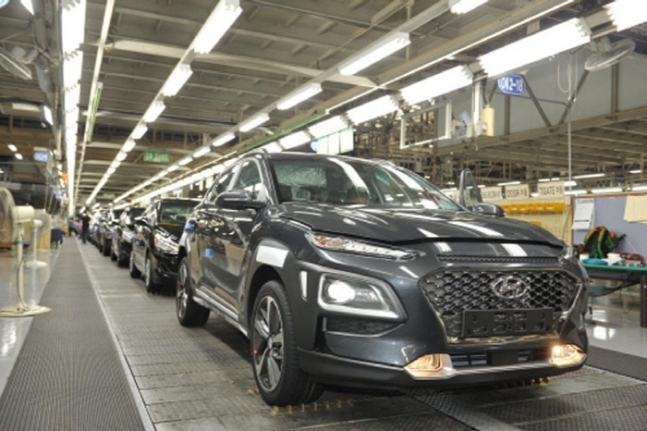 |
(Hyundai Motor Group) |
The prolonged outbreak of novel coronavirus has taken a toll on South Korean companies, especially automakers, due to their high dependence on various types of irreplaceable auto parts manufactured in China, according to industry insiders Wednesday.
Four of the country’s five major carmakers -- Hyundai Motor, Kia Motors, SsangYong Motor and Renault Samsung Motors -- have decided to temporarily suspend operations at their plants here due to the shortage of a crucial auto part called wiring harness.
Renault Samsung was the latest to announce that it is reviewing whether to suspend the production for two or three days from Tuesday, when the China-made wiring harness stocks will be depleted.
Supplies will inevitably be hit as the sourcing factory in China remains shut due to the extended Lunar New Year holiday and it will take about two or three days for production to fully mobilize, sources said.
According to industry data, some 100,000 manufacturing plants for auto parts are located across China, responsible for 38 percent of the global supplies.
The Chinese government has extended the holiday break with workplaces closed till Feb. 2 to curb potential exposure to the virus. Of the mainland’s 31 provinces, 11 have extended the holiday period for all nonessential businesses.
Following the factory closures in China, Korean automakers are experiencing inventory shortage of wiring harnesses.
Wiring harness is an essential part of a vehicle, which serves a nerve network-like role by connecting electric signals inside the car. Handmade wiring harnesses are laid on the floor of the vehicles during the initial assembly.
“Wiring harness was never considering an auto part that is difficult to get. Many industry insiders viewed that it can be substituted by local-made wiring harness or those from factories in Southeast Asian countries. That’s why many carmakers only keep stocks that can last for a week,” an official from a local carmaker told The Korea Herald.
He added that as different wiring harnesses are used for every car model, or even for the same model with different trims, it is not common for automakers to order large quantities in advance due to complicated stock management.
According to market experts, wiring harnesses cannot be replaced or be compatible with other auto parts.
“A vehicle is completed by assembling some 30,000 auto parts. Shortage of even one compatible auto part will put the brakes on production,” said another industry insider.
Market experts viewed that if the disruption of parts supplies in China continues, the industry’s earnings shortfall this year is inevitable.
Market research firm IHS Markit predicted that if the coronavirus spreads rapidly across the country it could trigger plant closures until mid-March, reducing output by more than 1.7 million vehicles annually -- a decline of 32 percent from last year.
Another market researcher Berstein said that major global automakers such as Volkswagen and BMW will see at least 5 percent fall in sales.
Meanwhile, some experts pointed to the automotive industry’s low dependency on plant operation automation as the reason why automakers are struggling.
According to industry sources, manufacturers in other sectors such as semiconductor, petrochemicals and display panels are seeing less damages from plant closures in China, as their production is done by robots through automated processes.
By Kim Da-sol (
ddd@heraldcorp.com)





![[Exclusive] Hyundai Mobis eyes closer ties with BYD](http://res.heraldm.com/phpwas/restmb_idxmake.php?idx=644&simg=/content/image/2024/11/25/20241125050044_0.jpg)
![[Herald Review] 'Gangnam B-Side' combines social realism with masterful suspense, performance](http://res.heraldm.com/phpwas/restmb_idxmake.php?idx=644&simg=/content/image/2024/11/25/20241125050072_0.jpg)

